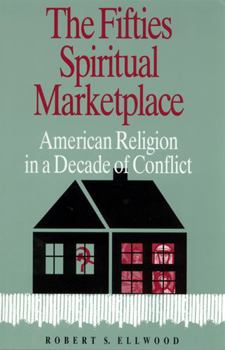The Fifties Spiritual Marketplace: American Religion in a Decade of Conflict
Select Format
Select Condition 
Book Overview
If you still hold the notion that the fifties were the "good old days," blessed with incomparable social affluence and widespread family unity, all buttressed by a strong, unconflicted spirituality, then look again. In this compelling narrative of religion in a decade still embraced by an indefatigable nostalgia, Robert Ellwood interrogates the notion of the fifties as an era of normalcy, and proves it to be full of spiritual strife. A companion to his Sixties Spiritual Awakening, Ellwood explores the major Catholic-Protestant tensions of the decade, the conflict between theology and popular faith, and the underground forms of fifties religiosity like "Beat" Zen, UFO contactees, Thomas Merton monasticism, and the Joseph Campbell / Carl Jung revival of mythology. Ellwood frames his detailed and lively account with the provocative idea of the fifties as a "supply-side" free enterprise spiritual marketplace, with heady competition between religious groups and leaders, and with church attendance at a record high. In addition to challenging an idealistic fifties cultural milieu, the book analyzes American religious responses to key historical events like the Korean War, McCarthyism, and the civil rights movement, turning a religious lens on the cultural history of the United States.
Format:Paperback
Language:English
ISBN:081352346X
ISBN13:9780813523460
Release Date:February 1997
Publisher:Rutgers University Press
Length:288 Pages
Weight:1.05 lbs.
Dimensions:0.8" x 6.0" x 9.0"
Customer Reviews
1 rating
Accessible, Critical, Readable, and Well-Constructed
Published by Thriftbooks.com User , 20 years ago
Robert Ellwood, a former Episcopal minister and expert on alternative and underground religions, has written a generally fine volume rethinking the role of religion in the 1950s. His premises follow largely from the iconoclastic work of Finke and Stark, and on the explosion of religion during this time period along multiple differing axes of analysis. At the same time his conclusions are more mainstream than Finke and Stark's, and his history of ideas focus is a welcome complement to other modes of analysis. As always, Ellwood begins with historical grounding. What must be firmly grasped about the 1950's above all else, is that it was a post-war period. Much of the confidence in modernist ideas that existed before WWI, The Worldwide Great Depression, and WWII was shredded through recent history. At the same time, with the advent of the fission (and soon, the fusion bomb) the relief and capital expansionism of the postwar era was tempered with apocalyptic fears concerning nuclear war and the political threat of both communism and third world indigenous nationalism. There are contrasting views of why church attendance skyrocketed--but there can be little doubt of its growth. Constant change and innovation through capitalism produced not only prosperity, but public anxiety over ongoing challenges to gender and racial roles,. These anxieties were tempered and adjusted to with the assistance of religious community-building for baby-booming families. The ways that churches capitalized on consumerist approaches to marketing no doubt was as significant in the 1950's as it was in the Progressive Era. Consensus ideology among many churches, Ellwood thinks, also help cement Jewish and Catholic identities as authentic forms of 'Americanness.' But similar impulses--fear and uncertainty, gave rise to American popular existentialism, both naturalist and Christian. UFO religion also expanded. Ellwood sees these both as a natural outgrowth of Cold War fears of instant destruction, and hopes for some form of outside intervention. (94). Commonalities exist for Ellwood in alternative leaders such as Thomas Merton, A.J. Muste, George Adamski, M.K. Ghandhi, D.T. Suzuki, Aldous Huxley and the movements inspired by them, for they all sought visions of community, however different from the mainstream. Different alternative responses were nonetheless united by a challenge to consensus forms of identity and being, even if their responses ranged from mystical and psychological introspection to the wanderlust of an American Beat Bhikku. Liberals are not forgotten either. The World Council of Churches is covered, and set into its post -Bikini Atoll context well. The 1955 emergence of M.L. King as a major religious activist figure becomes a focal point for soul-searching among white churches and adherents, especially as the new movement takes advantage of the media. But with Ellwood it is the waning mainline of Protestantism, and growing alternatives, both radical and react






